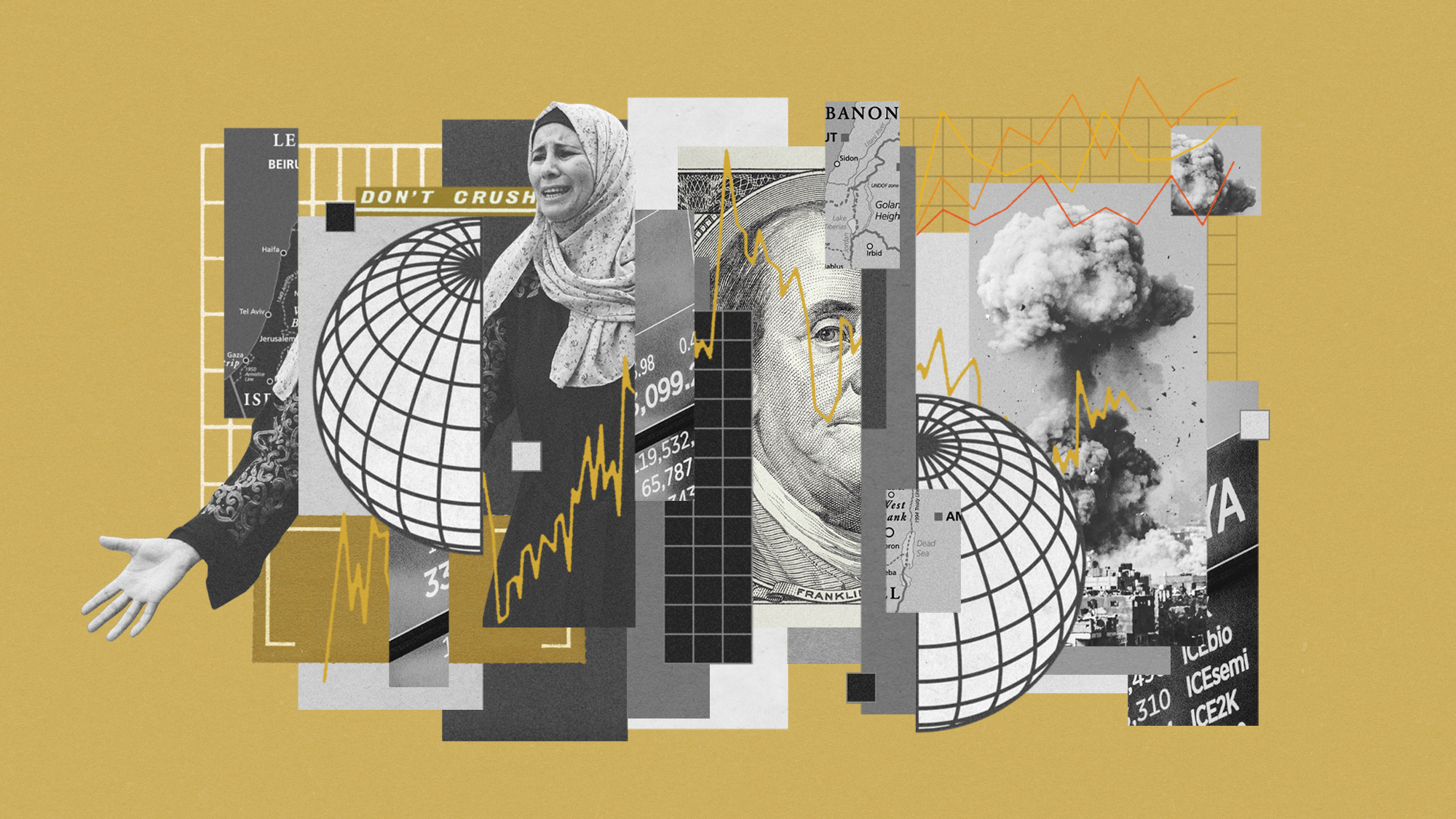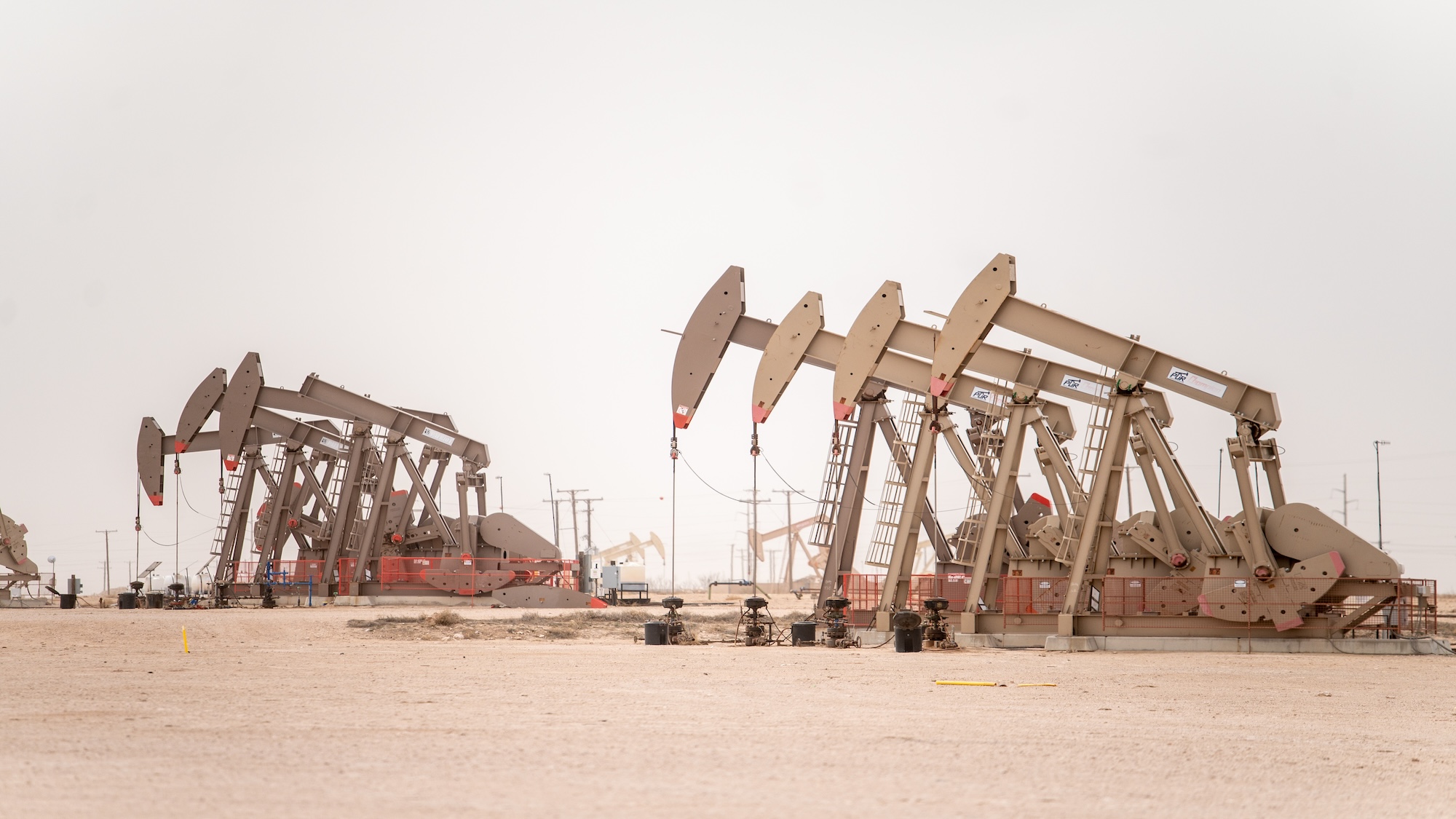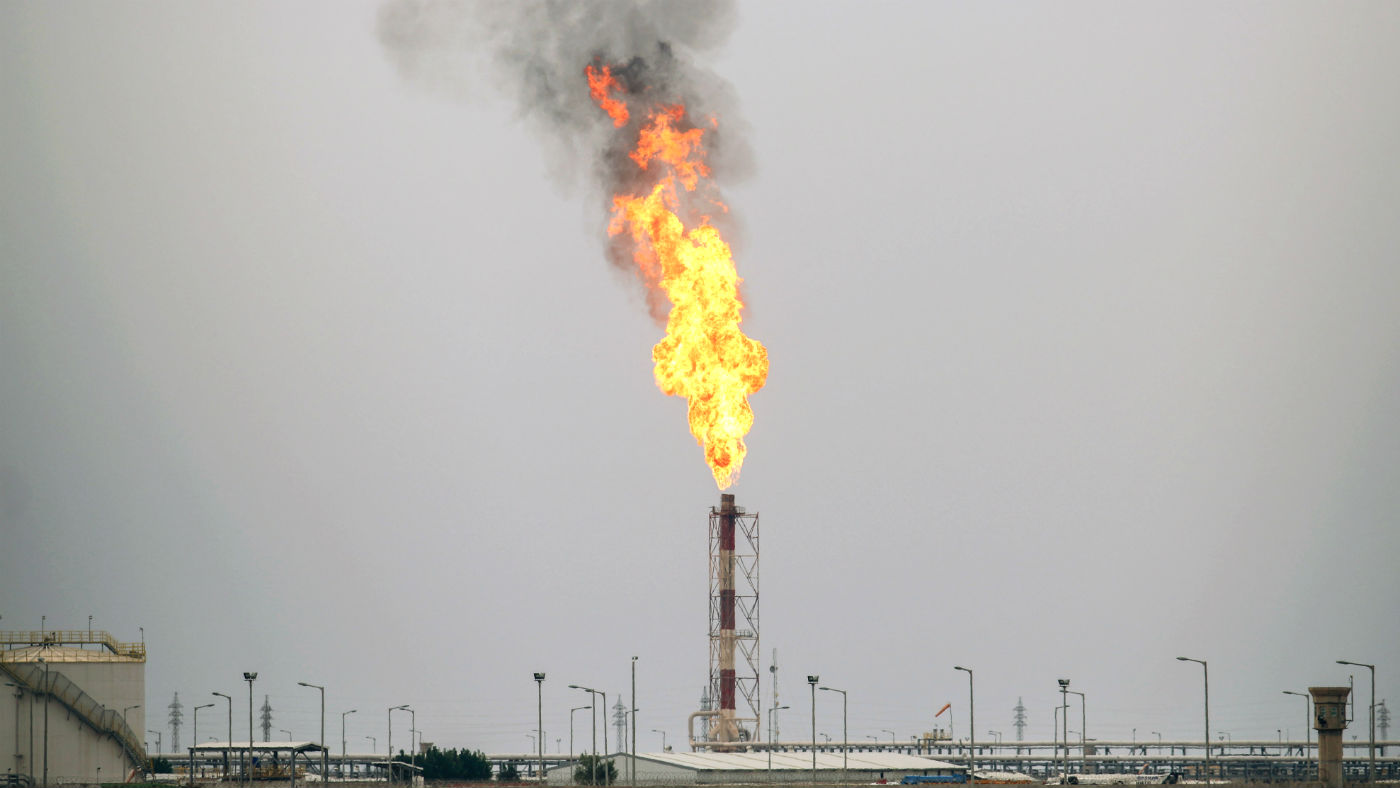Oil price posts two-year highs - but how long can it last?
Brent rose above $59 a barrel this week, its best third-quarter showing since 2004

A free daily email with the biggest news stories of the day – and the best features from TheWeek.com
You are now subscribed
Your newsletter sign-up was successful
Oil price plummets after Opec's 'quaint' cuts deal
26 May
The oil price defied expectations yesterday and fell markedly following Opec's announcement that it will extend its supply cuts into next year.
Oil's steep collapse two years ago was related to massive oversupply on global markets, leading the cartel and several other producers, including Russia, the world's largest supplier, to agree to reduce output by 1.8 million barrels per day.
The Week
Escape your echo chamber. Get the facts behind the news, plus analysis from multiple perspectives.

Sign up for The Week's Free Newsletters
From our morning news briefing to a weekly Good News Newsletter, get the best of The Week delivered directly to your inbox.
From our morning news briefing to a weekly Good News Newsletter, get the best of The Week delivered directly to your inbox.
Following that move, oil jumped from the low-$40s to more than $50 a barrel. However, it was held back from any further advance because global inventories remained high, in part due to a surge in US production related directly to the oil price recovery.
Yesterday, the original dealmakers agreed to extend the cuts for a further nine months, ending in March 2018, to give more time for suppressed supply to take effect on overstocked inventories.
Khalid al-Falih, oil minister for Opec's de facto leader Saudi Arabia, said: "We considered various scenarios from six to nine to 12 months and we even considered options for higher cuts.
"All indications are solid that a nine-month extension is the optimum and should bring us to within the five-year average of inventories by the end of the year."
A free daily email with the biggest news stories of the day – and the best features from TheWeek.com
However, several analysts - and, it would seem, traders - disagree. Opec's deal was followed by Brent crude, the international oil price benchmark, plummeting by five per cent to below $51.50 a barrel.
Its US counterpart West Texas Intermediate slipped more than five per cent to below $49 a barrel.
"Chris Beauchamp at online trading firm IG, described... Falih's belief that greater reductions were not needed as 'quaint', while Alexandre Andlauer of equity research firm Alphavalue said Opec's strategy was 'old-fashioned'," says the BBC.
Sushant Gupta, research director for Asia refining at Wood Mackenzie, told CNBC the fall was an "overreaction" because traders had priced in the nine-month extension already and wanted more.
"Markets are heading towards more rebalancing in Q3 and Q4 of this year," he added. "There will be a meaningful drawdown in inventories."
Oil prices volatile as Opec ministers meet
25 May
Oil prices are volatile as Opec ministers, along with other representatives from large oil suppliers around the world, meet in Vienna today to discuss an extension to production cuts.
Khalid Al-Falih, Saudi Arabia's energy and industry oil minister, told a press conference that a nine-month extension to that deal is looking like a "safe bet", says CNBC.
The original deal - for a six-month, 1.8 million barrels-per-day cut agreed by the likes of Opec and Russia - boosted the oil price from the low-$40s to the mid-$50s after it was announced at the end of last November.
But at the time of writing, international oil price benchmark Brent crude was down 0.6 per cent to $53.66 a barrel and its US counterpart West Texas Intermediate was down 0.8 per cent to a little less than $51 a barrel.
Given the general assumption that an extension is positive for bringing the oil market into balance, this may appear counter-intuitive.
However, the oil price is moving up and down in rough trading today so there is no evidence to suggest it will stay subdued if the nine-month extension is confirmed later.
Ministers also told journalists that other extension periods and levels of cuts had been discussed.
There is, though, a suggestion from some that traders had already "baked in" the current cuts being extended to March next year and that many were hoping for deeper cuts to speed up the process of balancing supply.
Miswin Mahesh, analyst at Energy Aspects, told CNBC "oil prices are always choppy" during Opec meetings and that there were "imbalances" on markets with some expecting deeper cuts.
Prices had fallen overnight after a US report yesterday revealed crude stocks fell by 4.4 million barrels last week, but petrol reserves fell by a less-than-expected 787,000 barrels, says Reuters.
How will the oil price react to Opec cuts decision?
24 May
The oil price is holding at recent highs on the eve of a key meeting in Vienna tomorrow among ministers from the Opec cartel.
Opec's 14 members are expected to agree to extend by nine months its existing deal on production cuts, which runs out in June.
Bilateral talks among member states and representatives from other countries are already taking place ahead of the main meeting. "Delegates from some oil suppliers outside the group" are present, says the BBC.
Saudi Arabia, Opec's de facto leader, and Russia, the non-Opec member which is the world's largest oil producer, have already signalled their support for an extension.
Saudi oil minister Khalid al-Falih "gave the thumbs up" when asked after one informal meeting if a nine-month extension had been agreed in principle, Reuters says.
This is now seen by traders as "the base-case scenario", meaning it is "priced in" and the oil price shouldn't move too much if the arrangement is announced.
The BBC says there may be a relief rally, but only to the "upper end of the recent range".
Opec's cuts have helped stabilise the market, but the resulting price recovery has triggered a revival of production in the US and it will take some time before global stocks swing into reverse.
Hopes the oil price might surge past $60 a barrel now appear far-fetched.
There are two other scenarios from tomorrow's formal meeting.
Firstly, that cuts are deepened from the 1.8 million barrels a day reduction in the current deal, something that had been talked about but is now seen as unlikely. If Opec surprised markets by announcing it had gone further than expected, oil prices would bounce more markedly.
Alternatively, it is possible the deal may be watered down either in terms of length or scale. In that case, expect oil prices to fall.
But the word in most places seems to be that the nine-month extension is nailed on, which means we're likely to see more of the same for the oil price for a while yet.
Will oil traders 'buy the rumour and sell the fact'?
22 May
Oil prices are edging higher, says Reuters, up around "ten per cent from lows earlier this month".
Optimism is back in fashion ahead of Thursday's meeting of ministers from the 14 countries in the Opec production cartel, who are expected to agree an extension of supply cuts into next year.
"The decision (to extend cuts) seems to be almost a done deal," said Bjarne Schieldrop, chief commodities analyst at SEB Markets.
"There seems to be a very high harmony in the group."
Sources close to Opec suggest a new deal could see deeper cuts than under the existing arrangement, which runs out next month and amounts to a reduction in output of 1.8 million barrels a day.
The current deal includes other producers such as Russia, which has stated it supports an extension.
On the back of these rumours, Brent crude, the international oil price, is up another one per cent today to in excess of $53 a barrel. Its US counterpart West Texas Intermediate is up by the same margin to close to $51 a barrel.
However, there are concerns that the market is effectively pricing in an extension and that traders might, having bought "the rumour", sell "the fact" on the basis that doubts over supply balance persist.
So far, despite high compliance with the production cuts, oil inventories have not been run down, while the more oil prices rise, the more US production increases, offsetting the effect of cuts elsewhere.
More simply, Commerzbank suggests traders might already be pricing in deeper cuts and so might be disappointed if a more straightforward extension is announced.
"If the cuts are merely to be extended, this is likely to be met at best with a neutral reception, if not even with disappointment," analysts said in a note.
Oil price: 'Battle between bulls and bears rages on'
19 May
The oil price was rising strongly today, breaking out of a rut ahead of a key meeting of Opec ministers next week.
Under discussion will be the finalising of a deal to extend production cuts until early next year, following the cartel's de factor leader Saudi Arabia and non-Opec Russia signalling their support last week.
Despite concerns over rising US production, that could be enough to inject fresh impetus into the oil price rally.
Brent crude, the international oil price benchmark, was up 2.1 per cent at $53.60 a barrel, while its US counterpart West Texas Intermediate was up by the same margin and back above $50. Both were at their highest level for more than a month.
However, despite the positive sentiment, "the battle between bulls and bears is raging on oil," Greg McKenna, chief market strategist at futures brokerage AxiTrader, told Reuters.
Oil had risen from the low $40s last November, when the original Opec supply deal was struck, and Brent has ranged between $47 and $56 a barrel since early March.Predictions from some bulls that it would surge past $60 seem a distant dream.
This week's data release in the US explains why: inventories remain well above long-term averages, US production is up this year and most experts believe the market is some way off being back in balance on supply.
"I think the cuts are enough to stabilise the market. I think they will likely bring some stock draws but I don't think it will bring the stock draws that Opec is hoping for," said Olivier Jakob, managing director at Petromatrix.
-
 Why are election experts taking Trump’s midterm threats seriously?
Why are election experts taking Trump’s midterm threats seriously?IN THE SPOTLIGHT As the president muses about polling place deployments and a centralized electoral system aimed at one-party control, lawmakers are taking this administration at its word
-
 ‘Restaurateurs have become millionaires’
‘Restaurateurs have become millionaires’Instant Opinion Opinion, comment and editorials of the day
-
 Earth is rapidly approaching a ‘hothouse’ trajectory of warming
Earth is rapidly approaching a ‘hothouse’ trajectory of warmingThe explainer It may become impossible to fix
-
 How might the Israel-Hamas war affect the global economy?
How might the Israel-Hamas war affect the global economy?Today's Big Question Regional escalation could send oil prices and inflation sky-high, sparking a worldwide recession
-
 Recent mega-mergers could signal a turning point for the US oil industry
Recent mega-mergers could signal a turning point for the US oil industryTalking Point Both Chevron and Exxon have recently spent billions to acquire smaller oil companies
-
 Has Saudi Arabia lost control of oil prices?
Has Saudi Arabia lost control of oil prices?Today's Big Question Kingdom goes it alone to cut production, risking tension with US and reigniting cooling inflation in Europe
-
 US angered by Opec+ oil cut
US angered by Opec+ oil cutSpeed Read Energy prices to rise further as producers slash supply by two million barrels a day
-
 Global oil demand forecast lowered for 2020 and 2021
Global oil demand forecast lowered for 2020 and 2021Speed Read IEA report says jet fuel demand remains the major source of weakness
-
 Are US-Iran tensions flaring again?
Are US-Iran tensions flaring again?In Depth Trump threatens military action over Twitter
-
 Can a deal be struck to raise oil prices?
Can a deal be struck to raise oil prices?In Depth Opec+ will convene today over video link in a bid to boost crude
-
 What do negative oil prices mean?
What do negative oil prices mean?In Depth Perfect storm of oversupply and storage shortages sees producers paying to get rid of US crude